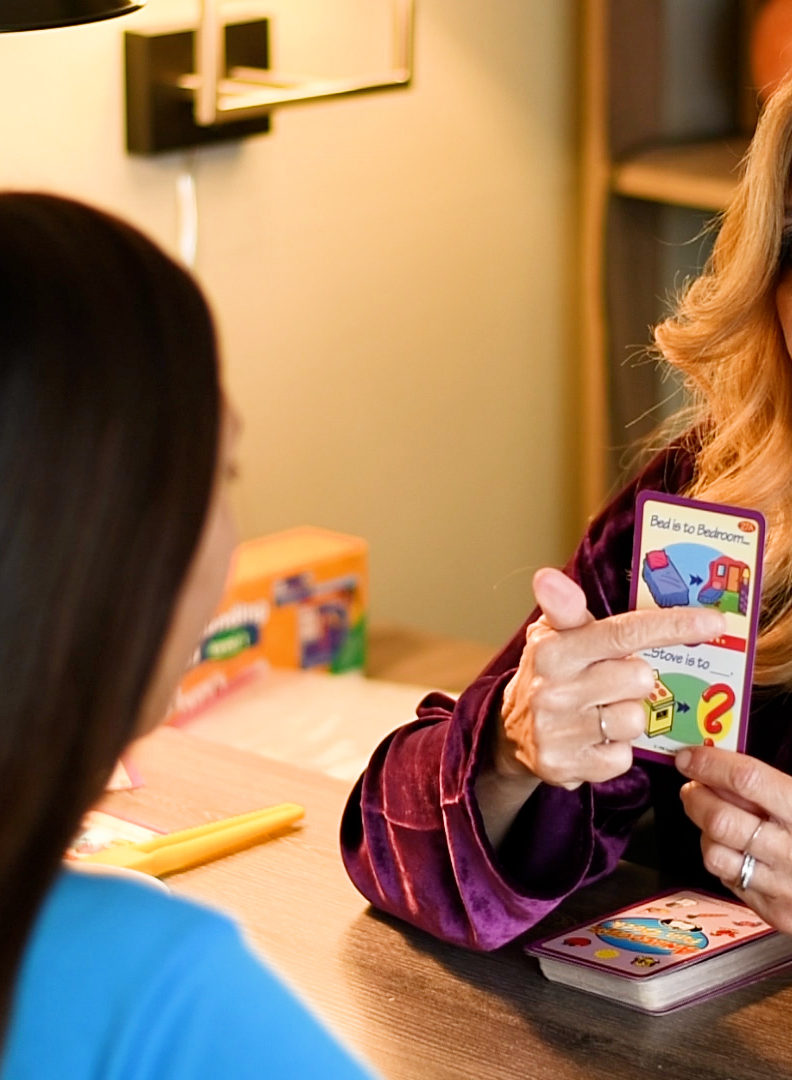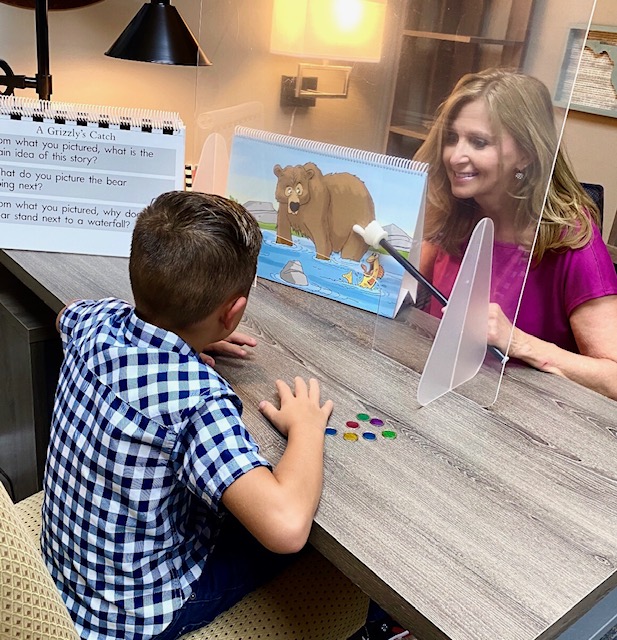Trained in the scientist-practitioner model, Dr. Carmichael seeks to utilize evidence-based assessments and interventions that reflect the best practice model. She relies on a comprehensive clinical interview with the parent/caregiver, review of any available records, consideration of medical history and psychosocial history, standardized behavior rating scales, information from teachers/caregivers (via interview or standardized behavior ratings,) observation/play with the child as well as administration of standardized assessments that have been well-researched in populations with disabilities (i.e., Differential Ability Scales-Second Edition, Reynolds Intellectual Assessment System-Second Edition, the Childhood Autism Rating Scale-Second Edition, the DKEFS, the BASC-3, BRIEF-2 and the Autism Diagnostic Observation Schedule-Second Edition.)

The Process
For autism evaluations, Dr. Carmichael refers to guidelines for best practice assessment for individuals with autism spectrum disorders as outlined by the American Academy of Neurology and the American Academy of Child and Adolescent Psychiatry, which promote a comprehensive, developmental approach.
Best practices in the assessment of autism is a highly-evolving area due to the flood of research into the areas of autism, causes, core impairments, related affected areas and how to most adequately measure this. Autism also looks quite different in children at different ages and level of language development or cognitive development, requiring constant upkeep with the literature. Assessment of the child or adult may also include collaboration or consultation with the pediatrician, developmental pediatrician, child psychiatrist, therapist, speech pathologist, occupational therapist, special education teacher or other professionals.
Who’s Included?
More and more, we are seeing children, both young and many quite older, particularly girls, who are struggling behaviorally and whom have never had a psychological evaluation despite significant learning struggles or behavioral or emotional challenges. This reflects the need for a dimensional approach to assessment and treatment (which the DSM-V has helped by removing autism as categorical and re-classifying it as a spectrum disorder) as many children have mild impairments that affect them in one domain while others have global concerns.

So, to summarize, the purpose of an assessment is to determine the reason that friendships, emotional regulation, learning or work is challenging, and to help guide your family as to what to do about it. While every assessment is individualized for you, the following outlines the general process of what to expect when you work with me. We typically complete all of the testing in one day, which is often completed by noon. If not, we can finish up after a lunch break.
* History and Interviews: The first step is to learn as much about you or your child as possible. This involves an interview with family and caregivers, many formal questionnaires for parents, teachers and your child, and a review of records. During this time, your child can get comfortable in the room and play. If you prefer not to speak about subjects in front of them, we can conduct the interview via phone prior to the evaluation, just let me know in advance.
* 1-1 Testing: Direct testing usually includes one session on one day to complete specific activities that assess areas such as cognitive ability, problem solving, auditory and visual processing, memory, academics, social skills, emotional processing, and behavior. Specific tests are chosen based on the student’s individual challenges. You will be provided with the diagnosis and recommendations directly after the testing with a brief written form to remember what we discussed.
* Written Report: Within two weeks (sometimes up to four), you will receive a comprehensive written report, which includes the complete results of the assessment and recommendations for home and school. If you want to meet in person or via the phone for a more in-depth feedback session, to review the results and to help you identify your next steps, we can also do this.
* Follow Up: Many parents and adult clients find that additional questions arise down the road. Dr. Carmichael is available to you to answer these or provide necessary information (e.g., ABA referrals, clarification for the ACT/SAT Board) as needed, usually without any additional fee.

 So, to summarize, the purpose of an assessment is to determine the reason that friendships, emotional regulation, learning or work is challenging, and to help guide your family as to what to do about it. While every assessment is individualized for you, the following outlines the general process of what to expect when you work with me. We typically complete all of the testing in one day, which is often completed by noon. If not, we can finish up after a lunch break.
* History and Interviews: The first step is to learn as much about you or your child as possible. This involves an interview with family and caregivers, many formal questionnaires for parents, teachers and your child, and a review of records. During this time, your child can get comfortable in the room and play. If you prefer not to speak about subjects in front of them, we can conduct the interview via phone prior to the evaluation, just let me know in advance.
* 1-1 Testing: Direct testing usually includes one session on one day to complete specific activities that assess areas such as cognitive ability, problem solving, auditory and visual processing, memory, academics, social skills, emotional processing, and behavior. Specific tests are chosen based on the student’s individual challenges. You will be provided with the diagnosis and recommendations directly after the testing with a brief written form to remember what we discussed.
* Written Report: Within two weeks (sometimes up to four), you will receive a comprehensive written report, which includes the complete results of the assessment and recommendations for home and school. If you want to meet in person or via the phone for a more in-depth feedback session, to review the results and to help you identify your next steps, we can also do this.
* Follow Up: Many parents and adult clients find that additional questions arise down the road. Dr. Carmichael is available to you to answer these or provide necessary information (e.g., ABA referrals, clarification for the ACT/SAT Board) as needed, usually without any additional fee.
So, to summarize, the purpose of an assessment is to determine the reason that friendships, emotional regulation, learning or work is challenging, and to help guide your family as to what to do about it. While every assessment is individualized for you, the following outlines the general process of what to expect when you work with me. We typically complete all of the testing in one day, which is often completed by noon. If not, we can finish up after a lunch break.
* History and Interviews: The first step is to learn as much about you or your child as possible. This involves an interview with family and caregivers, many formal questionnaires for parents, teachers and your child, and a review of records. During this time, your child can get comfortable in the room and play. If you prefer not to speak about subjects in front of them, we can conduct the interview via phone prior to the evaluation, just let me know in advance.
* 1-1 Testing: Direct testing usually includes one session on one day to complete specific activities that assess areas such as cognitive ability, problem solving, auditory and visual processing, memory, academics, social skills, emotional processing, and behavior. Specific tests are chosen based on the student’s individual challenges. You will be provided with the diagnosis and recommendations directly after the testing with a brief written form to remember what we discussed.
* Written Report: Within two weeks (sometimes up to four), you will receive a comprehensive written report, which includes the complete results of the assessment and recommendations for home and school. If you want to meet in person or via the phone for a more in-depth feedback session, to review the results and to help you identify your next steps, we can also do this.
* Follow Up: Many parents and adult clients find that additional questions arise down the road. Dr. Carmichael is available to you to answer these or provide necessary information (e.g., ABA referrals, clarification for the ACT/SAT Board) as needed, usually without any additional fee.

